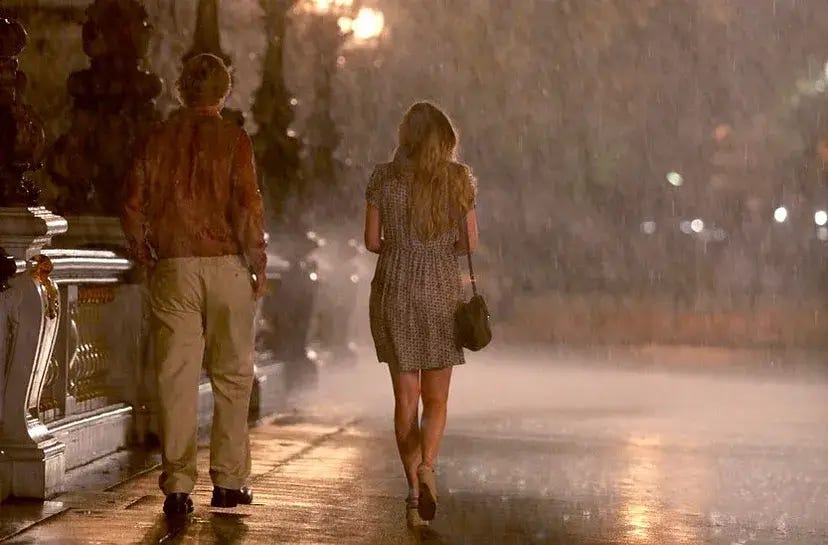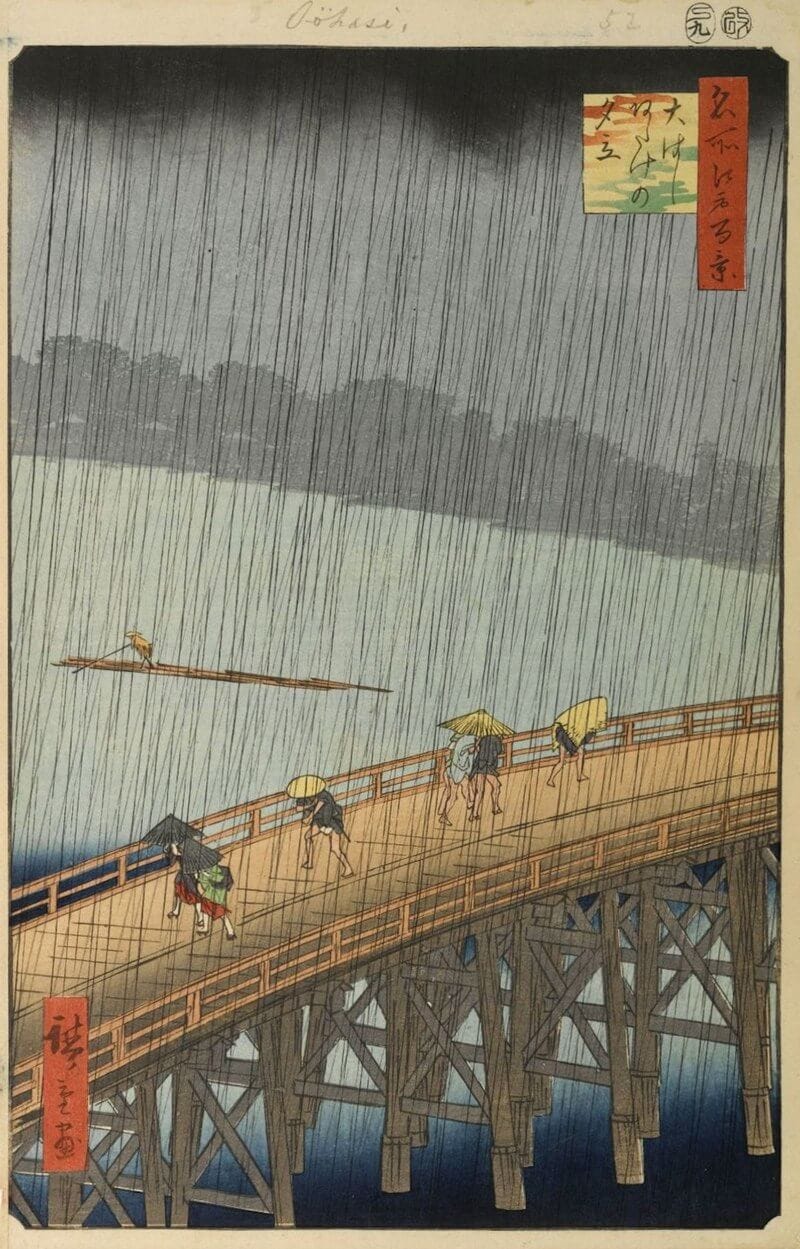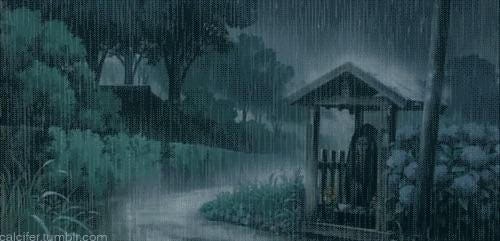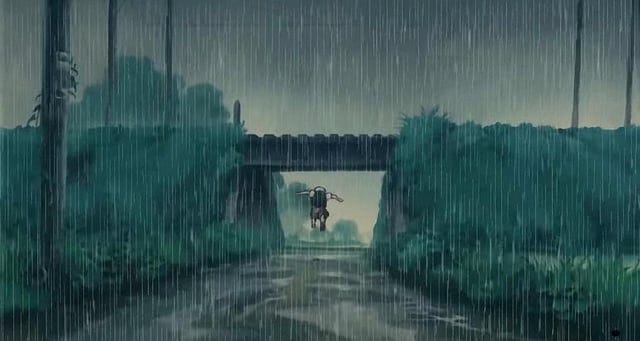As I sit here in the humanities library (ok, I'm hunched over a laptop at the foot of my bed, but sue me, I enjoy the imagery) I'm looking out of the window at a rain that has been, shall we say, persistent.
When conceived, the idea of this ‘perspectives’ feature was to rifle through the bookshelves with a specific Big Question in mind, seeking insights from the greatest minds in history to help us answer those existential problems of the human condition, but today I find myself wondering about one thing over anything else.
Should I bother going out into the wet evening?
Virginia Woolf knew the feeling of uncertainty that comes with a look up into the UK sky, and in 1937's The Years she suggests that even the sheep share in the doubt.
It was raining. A fine rain, a gentle shower, was peppering the pavements and making them greasy. Was it worth while opening an umbrella, was it necessary to hail a hansom, people coming out from the theatres asked themselves, looking up at the mild, milky sky in which the stars were blunted. Where it fell on earth, on fields and gardens, it drew up the smell of earth. Here a drop poised on a grass-blade; there filled the cup of a wild flower, till the breeze stirred and the rain was spilt. Was it worth while to shelter under the hawthorn, under the hedge, the sheep seemed to question; and the cows, already turned out in the grey fields, under the dim hedges, munched on, sleepily chewing with raindrops on their hides.
Gustave Caillebotte, Paris Street – Rainy weather (1877)
What's the worst that can happen if I go out there? Only a fool huddles in doorways. It's just water, after all, that most gentle of substances. For Herman Boerhaave, writing his Elemens de Chimie in 1754, fresh water is…
so gentle that, reduced to the degree of heat found in a healthy person and then applied to the most sensitive parts of our body (like the cornea of the eyes, the membrane of the nose), not only does it cause no pain, but it produces no sensation at all which differs from that caused by our humors ... in their natural state… Poured onto ulcerous parts or on raw flesh . . . it produces no irritation. Hot compresses applied to exposed nerves partly consumed by an ulcerated cancer, far from increasing the acuteness of the pain, actually alleviate it
Camille Pissarro, Boulevard Montmartre, Spring Rain (1897)
So rain causes us no irritation, no pain, and can even alleviate the worst excesses of suffering. Maybe we need a bit of a soak? Building on this idea, here's philosopher Gaston Bachelard in 1942’s brilliantly titled Water and Dreams:
The premonitory signs of rain awaken a special reverie, a most vegetal reverie, that truly lives out the meadow's desire for beneficial rain. At certain times the human being is a plant that desires water from the sky.
Beneficial rain. Bachelard almost makes it sound like rain is a source of happiness. And maybe it is? If a good old dousing can draw a smile from the world's most famous literary curmudgeon then who can say what it will do for us? Here's Holden Caufield in J.D. Salinger's The Catcher in the Rye (1951):
Boy, it began to rain like a bastard. In buckets, I swear to God. All the parents and mothers and everybody went over and stood right under the roof of the carrousel, so they wouldn’t get soaked to the skin or anything, but I stuck around on the bench for quite a while. I got pretty soaking wet, especially my neck and my pants. My hunting hat really gave me quite a lot of protection, in a way; but I got soaked anyway. I didn’t care, though. I felt so damn happy all of a sudden, the way old Phoebe kept going around and around. I was damn near bawling, I felt so damn happy, if you want to know the truth. I don’t know why. It was just that she looked so damn nice, the way she kept going around and around, in her blue coat and all. God, I wish you could’ve been there.
But let's not set the bar too high. At the very least, a good rain is unquestionably beautiful. Especially the rain that surprises us in the summer. Here's Emily Dickinson on a Summer Shower in 1896:
A Drop fell on the Apple Tree – / Another – on the Roof – / A Half a Dozen kissed the Eaves – / And made the Gables laugh –
A few went out to help the Brook, / That went to help the Sea – / Myself Conjectured were they Pearls – / What Necklaces could be –
Oh isn't it just lovely when it pours down? Especially in Paris. In Woody Allen's Midnight in Paris (2011), the sensitivity and wonder of Owen Wilson's Gil is contrasted with the materialism of his fiancée Inez and her mother by the very fact of their attitude towards walking in the rain.
“Are you sure you don’t want to walk in the rain? It’s our last chance.”
Chance. How much of the character’s mindset is revealed through that one word? And, when it comes down to it, maybe it's all really about mindset. As Roger Miller once said…
“Some people feel the rain; others just get wet”
So, how to feel it? How to be more Gil and less Inez, if that's what the artists are telling us to be? Well, maybe it starts with a simple appreciation. A detailed attention to the nuances of rain is evident in Japan, and is reflected in the language used to describe the subtle variations of downpour. Here's what ChatGPT gives me when I ask it for examples:
雨 (Ame): General term for rain.
小雨 (Kosame): Light rain or drizzle.
大雨 (Ōame): Heavy rain.
霧雨 (Kirisame): Misty rain.
夕立 (Yūdachi): Sudden evening shower.
長雨 (Nagaame): Prolonged rain.
春雨 (Harusame): Spring rain.
梅雨 (Tsuyu): Rainy season (monsoon period).
驟雨 (Shūu): Sudden shower.
五月雨 (Samidare): Early summer rain (around May).
村雨 (Murasame): Passing shower.
氷雨 (Hisame): Freezing rain.
土砂降り (Doshaburi): Torrential rain.
俄雨 (Niwakaame): Rain that falls suddenly and heavily for a short period.
霧 (Kiri): Fog or mist, often with very light rain.
毛雨 (Keu): Rain so light it feels like it’s only a few droplets at a time.
時雨 (Shigure): Rain that falls intermittently, particularly in late autumn or early winter.
霧雨 (Kirisame): Very light rain that looks like mist.
Utagawa Hiroshige, Sudden Shower over Shin-Ōhashi Bridge and Atake, 1857
Walking with our eyes open to the beauty and subtlety of rain can, it seems, even make us a more attractive romantic partner, for men especially (what better way to pull off the brooding sensitive look?) At least that's what I take from The Ronettes, who memorably sang in 1964:
I want him, and I need him, / And someday someway woo I'll meet him / He'll be kind of shy, and real good lookin' too / And I'll be certain he's my guy by the things he'll like to do / Like walking in the rain / And wishing on the stars up above / And being so in love
Maybe, huddling under cover from the rain could even be the place we first meet the person we'll grow to love, as happens in Wong Kar-Wai’s In the Mood for Love (2001), whose depictions of Typhoon Wanda, which hit Hong Kong in September 1962, are some of the most memorable images of rain ever put to screen.
And, whilst we're on rain-on-screen, it must be mentioned that nobody does it better than Studio Ghibli…
But what of remaining indoors? After all, we're not, as Bachelard’s metaphor suggests, plants, thirsty for rain. We're people, and people have been creating shelter for as long as we've been around. As Henry David Thoreau suggests in 1854’s Walden, let the plants soak up the ‘goodness’ whilst we enjoy our benefits one step removed from a drowning:
The gentle rain which waters my beans and keeps me in the house today is not drear and melancholy, but good for me too. Though it prevents my hoeing them, it is of far more worth than my hoeing. If it should continue so long as to cause the seeds to rot in the ground and destroy the potatoes in the low lands, it would still be good for the grass on the uplands, and, being good for the grass, would be good for me, too.
But sometimes, despite our best efforts to remain positive, when the rain is really rain, like Icelandic rain, there's just no escaping it, indoors or out. This is from Halldór Laxness’s Independent People (1935):
Shortly afterwards it started raining, very innocently at first, but the sky was packed tight with cloud and gradually the drops grew bigger and heavier, until it was autumn’s dismal rain that was falling—rain that seemed to fill the entire world with its leaden beat, rain suggestive in its dreariness of everlasting waterfalls between the planets, rain that thatched the heavens with drabness and brooded oppressively over the whole countryside, like a disease, strong in the power of its flat, unvarying monotony, its smothering heaviness, its cold, unrelenting cruelty. Smoothly, smoothly it fell, over the whole shire, over the fallen marsh grass, over the troubled lake, the iron-grey gravel flats, the sombre mountain above the croft, smudging out every prospect. And the heavy, hopeless, interminable beat wormed its way into every crevice in the house, lay like a pad of cotton wool over the ears, and embraced everything, both near and far, in its compass, like an unromantic story from life itself that has no rhythm and no crescendo, no climax, but which is nevertheless overwhelming in its scope, terrifying in its significance. And at the bottom of this unfathomed ocean of teeming rain sat the little house and its one neurotic woman.
Wow. Perhaps all this romanticising of the rain remains the privilege of artists in the more temperate climates!
L'Averse, Felix Edouard Vallotton, 1894
So what to do? The rain continues to hammer against the pane, the shadows are two hours longer and I remain rooted to the spot. I'll leave you, I think, with a final thought in the form of a short poem by Gary Snyder that probably expresses all the beauty, nourishment and inertia of the previous extracts inside three lines:
It is raining. / I guess I’ll make / Some tea.














Thank you for this delightful essay! I particularly enjoyed the wide range of references unified in such an engaging way. On the romance front, this discussion brings to mind _Persuasion_ by Jane Austen. I adore the scene where Captain Wentworth offers Anne his umbrella to protect her from Bath’s showers—“I wish you would make use of it, if you are determined to walk; though, I think, it would be prudent to let me get you a chair.” Needless to say, Wentworth’s sincere concern for Anne’s welfare foreshadows their beautiful reconciliation in the novel’s conclusion.
This was nicely done.
I read it and thought of Brahms's Regenlied:
https://www.youtube.com/watch?v=raoj-Sgfnag